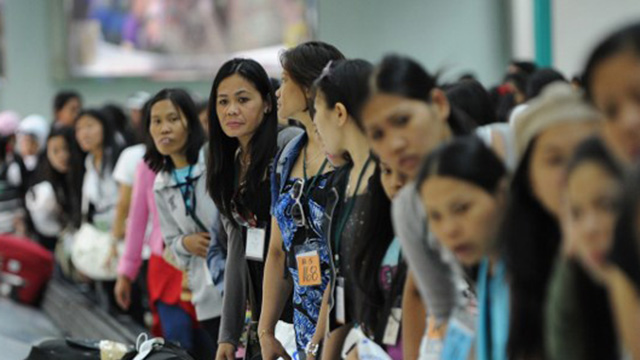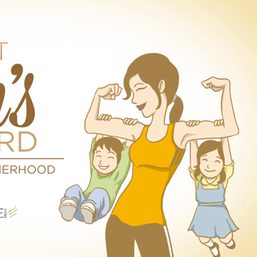SUMMARY
This is AI generated summarization, which may have errors. For context, always refer to the full article.

MANILA, Philippines – In anything that they do, women could show greater strength in numbers. But what if the numbers are oddly against them sometimes?
If recent numbers are to be believed, studies will still show that gender biases continue to exist in certain areas of Philippine society where we thought they had already been quelled. The odds are indeed not in favor of Filipino females, according to a survey conducted by Laylo Research Strategies, which was presented at the Women Beating The Odds forum held last November 2013 and organized by Pantene and Rappler.
(READ: WHIPIT: NCR survey results on women’s issues.)
Granted that the survey was focused on the National Capital Region (NCR), the respondents included a good distribution of men and women coming from different socioeconomic spheres. And one quaint fact remains: even if men and women believe – and perceive – that women could do more, true gender emancipation still has to be attained.
Self-perception vs. self-emancipation
It all starts with perception. The numbers showed that Philippine society still harbors a mindset that hinders Filipinas from truly shining on their own. For instance, only 36% of women do not feel harshly judged compared to men when they commit mistakes. What about the rest of the percentage?
Or how about 45% of females voicing that it’s not acceptable for men to be aggressive and ambitious than women. So that means more than 50% think that it’s totally fine for men to be more aggressive and ambitious? No wonder we snide at female public figures and personalities who show strength in their character.
(READ: WHIPIT on self-labeling)
Of course, there is still hope. The numbers also show that around 3 out of 10 women are slowly asserting that they should prioritize time for themselves. This involves harnessing their personal lives for the better, as well as improving their professional lives.
But before change could be reflected in the larger context, it has to start within the basic unit of society: the family.
Household and family musings
While men per se don’t really create barriers for women, many believe that women and men should work together in order to remove multiple burdens put on women by such restricting societal constructs. And yes, hope shimmers anew, even in small portions.
(READ: WHIPIT women burdens success)
When it comes to running a household, for instance, 6 out of 10 believe that both genders should do their part in all domestic roles such as cooking and taking care of the children. While a certain machismo mentality still lingers about men being the sole breadwinners, many families have smartened up. About 70% agree that feeding the family should be a task shared by men and women. And the usual demeaning perception of the mother-wife role has drastically changed, for 8 out of 10 agree that being a housewife is just as fulfilling as working for pay.
Other numbers corroborate this changing mindset. In the 2013 Lila Report released by the Center for Women’s Resources (CWR), only 5 out of 10 still believe that it’s more important for the mother to stay at home for the kids. The report also reflected that 58% of males believe that a woman should not sacrifice her career for her family. Additional figures from the 2013 Filipino Fact Sheet compiled by the Philippine Commission on Women (PCW) also reflect that the number of female-headed households has increased from 10% to 21% since the 1970s.
And to go back to the Laylo survey, this is pushed by the fact that 76% believe a woman who prioritizes her career over marriage and family is seeking personal accomplishment. An added layer of support is the fact that 56% think it’s totally alright for a woman to earn more than a man, as 68% also believe that a Filipina who earns an income cares more for the needs of others.
Indeed, hope is not yet lost, and changes are happening within the Filipino household. But is it also a hopeful scenario when women step out of the home and enter the workforce?
From education to earnings
Filipino families prepare for the future by entrusting their children to the educational system, usually with the sole hope that academic preparation would equip future citizens with the skills needed in the labor force.
While it’s a sad fact that 65% of those surveyed in NCR still think that it’s more important for men to finish a university education, the Lila Report showed a happier fact: that more women are encouraged to pursue education. More precisely, the number of women enrolled in school increased by 5% since 2011. And while the report also mentioned that only 7% of those enrolled finish their studies, slightly more females graduate from college compared to males.
So of course, if more women get to finish their schooling, there should be an increase in the number of women who enter the workforce. The PCW Fact Sheet reflected this, as their tally showed that more females have participated in the labor force since 2009, and female employment was at 14.2 million compared with 22.3 million males. Furthermore, the Lila Report showed that an increasing number of Filipinas are entering the international labor force as they choose to become overseas Filipino workers (OFW). In 2012 alone, around 47.8% of OFWs tallied were women.
In between work and family is society
Slowly – but surely, as the numbers showed – Filipinas are making their mark, regardless of what society perceives. Right now, 5 out of 10 women in the NCR survey believe that Filipinas who work have ambition. And when they say ambition, this is regarded as a positive thing. Furthermore, women don’t believe that men make better bosses. Yes, around 48% said so. So there is indeed some shifting going on.
And in terms of other factors in society, women are also involved. Whether within a personal or political site of struggle, women are inching their way towards having better scenarios for themselves. And yes, men, too, join in on this journey.
Partial proof of that is seen in politics. Contrary to popular perception, women care about what goes on in the country. The PCW Fact Sheet reflected that more women vote than men. Women’s suffrage is very much alive as well, as 73% of females exercise their right to vote for their leaders as compared to 72% of men. Not bad for a country where women are usually perceived to be silent in most things political, right?
And speaking of silence – or perhaps the opposite of such – women are also speaking up about other things. While there is still that persisting perception that Filipinos are generally conservative in attitude and demeanor, both men and women in the NCR survey point out a changing path of thinking: 5 out of 10 surveyed say that it’s totally alright for a woman to discuss sex more openly. Another taboo pointed to another usual female stereotype: having children out of wedlock. Around 77% of both the male and female respondents agree that being a single mother is not something to be ashamed of anymore.
(READ: WHIPIT behind the labels)
New Year wishing: more cheers or more jeers?
Let’s not think that discussions of gender issues, of “women versus men” concepts, or of perceptions of Filipinas in society are already cliché and outdated. If they are, then these numbers shouldn’t matter anymore. But they do.
And if it’s clichés we’re talking about, it’s easy to say that yes, we have a long way to go. But hey, we could also say that we have also come a long way. Seeing that Filipino culture sometimes reflects a mix of ironies and contrasts, it’s quite refreshing to see that both women and men care for change to happen. And the numbers are there to prove it.
So will 2014 fare better for women? For the improvement of our culture, let’s hope so. Let’s all participate in tipping the scales – not in favor of women over men, but in favor of the authentic emancipation of women in society.
Make your voice – and actions – count. – Rappler.com
#WHIPIT – A challenge for women to be empowered and shine boldly by defying beyond labels and stereotypes
Watch out for the full results of the survey and more discussions on gender bias here on Rappler. You can also join our #WHIPIT Wednesdays conversations.
Add a comment
How does this make you feel?




There are no comments yet. Add your comment to start the conversation.